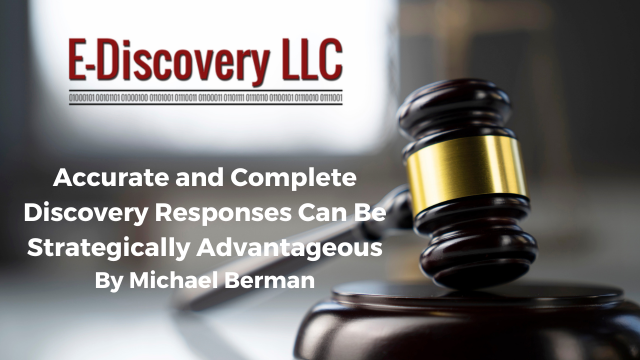
[EDRM Editor’s Note: The opinions and positions are those of Michael Berman.]
Blogs frequently focus on recent decisions. I came across an older one that is also worth noting.
Everyone has seen discovery responses that seek to hide the ball. In Management and Constr. Svcs., LLC v. Sayers Constr., LLC, 2021 WL 981780 (D. Md. Mar. 16, 2021)(Coulson, J.), the Court took a very different approach and stated that accurate and complete responses provide a strategic advantage. It wrote:
Accurate and complete discovery responses are not only a responsibility of counsel and their client, but also an opportunity for counsel and their client. It is one of the rare times during the uncertainty of litigation where counsel can tell their client’s story in precisely the most persuasive way possible. Discovery also presents counsel with the opportunity to have frank discussions with their clients so as to assess what precise documents and testimony are available to support their case, and to surface challenges in the case that need to be addressed. [emphasis added].
Management and Constr. Svcs., LLC v. Sayers Constr., LLC, 2021 WL 981780 (D. Md. Mar. 16, 2021)(Coulson, J.).
The Court described the lawsuit as follows:
Despite its factual complexity, the case centers on nonpayment for work performed on certain specified shared projects, with the justification for withholding payment being that Plaintiff allegedly performed unauthorized medium and high voltage electrical work that Defendants themselves could have performed more economically, and that the work so performed was nonconforming.
Management and Constr. Svcs., LLC v. Sayers Constr., LLC, 2021 WL 981780 (D. Md. Mar. 16, 2021)(Coulson, J.).
The discovery dispute presented a bread-and-butter issue. Plaintiff sought leave to serve additional document requests and additional requests for admission. Defendants opposed the requests.
The Management and Constr. Svcs., Court held a telephone conference to resolve those and other issues. It noted that the Local Rules provided discretion to grant the request and wrote:
This recognizes that this Court handles a wide variety of cases of differing complexity, making a “one size fits all” approach impossible.
Management and Constr. Svcs., LLC v. Sayers Constr., LLC, 2021 WL 981780 (D. Md. Mar. 16, 2021)(Coulson, J.).
Determining that there were seven disputed projects at issue and noting that the Second Amended Complaint contained 240 paragraphs, the Court expanded discovery.
The Court added:
Nonetheless, even where an expansion may be appropriate, this Court (and the parties) always have the responsibility to administer rules to “secure the just, speedy, and inexpensive determination of every action.” Fed. R. Civ. P. 1.
Management and Constr. Svcs., LLC v. Sayers Constr., LLC, 2021 WL 981780 (D. Md. Mar. 16, 2021)(Coulson, J.).
It then proceeded to offer “guidance.” It wrote that discovery should be “tailored” to collecting information about the seven projects at issue and the allegedly unauthorized work.
By contrast, [plaintiff’s] discovery requests seeking information that “concerns, refers, or relates to” essentially any allegation in the complaint or counterclaim or similar non-specific requests are difficult to respond to. [Defendant] Sayers should do its best with such requests, but the Court will not subject Sayers’ responses to such requests to tremendous scrutiny given their generalized nature.
Management and Constr. Svcs., LLC v. Sayers Constr., LLC, 2021 WL 981780 (D. Md. Mar. 16, 2021)(Coulson, J.).
The Court then turned to defendants:
For their part, Defendants will not be allowed to avoid discovery based solely on general boilerplate objections. Allegations of burden should be detailed and specific. Assertions of privilege should be accompanied by a compliant privilege log describing any relevant documents withheld on that basis. (Concerns of inadvertent waiver can be assuaged by joint submission of a FRE 502(d) order.) If objections are asserted, the responses should make clear whether any information has been withheld based on the objection, rather than making Plaintiff and the Court guess by attempting to hedge any production with the impermissibly obscuring phrase “notwithstanding these objections….”
Management and Constr. Svcs., LLC v. Sayers Constr., LLC, 2021 WL 981780 (D. Md. Mar. 16, 2021)(Coulson, J.).
For more on general objections, please see General Objections, Dracula, and “Whac a Mole” (Apr. 16, 2024). For more on privilege logs, please see How Much Detail is Enough in a Privilege Log? (Apr. 9, 2024), and Privilege Logs: New Techniques to Achieve Proportionality – The “Certification Log” (Mar. 4, 2024).
The Management and Constr. Svcs., Court wrote that counsel were of “high caliber” and have a “long history of dealing with each other….” It wrote that it “strongly suspects” that “there could largely be agreement on what information and documents are relevant to deciding this dispute. In fact, the parties may well have marshalled some of it in preparing for their intervening mediation.”
The decision stated that: “It will be a far more efficient process if counsel works together collaboratively in facilitating that exchange.”1
Notes
1 See There’s No Right or Wrong Answer – But There Are Mistakes (Apr. 19, 2024)(“In Rayome v. ABT Electronics, 2024 WL 1435098 (N.D. Ill. Apr. 3, 2024), the court wrote that ‘it would be in the parties’ interest to reach a negotiated result. It should not be forgotten that a party could be ‘right,’ but find itself on the losing side of a court’s ruling.’”).


